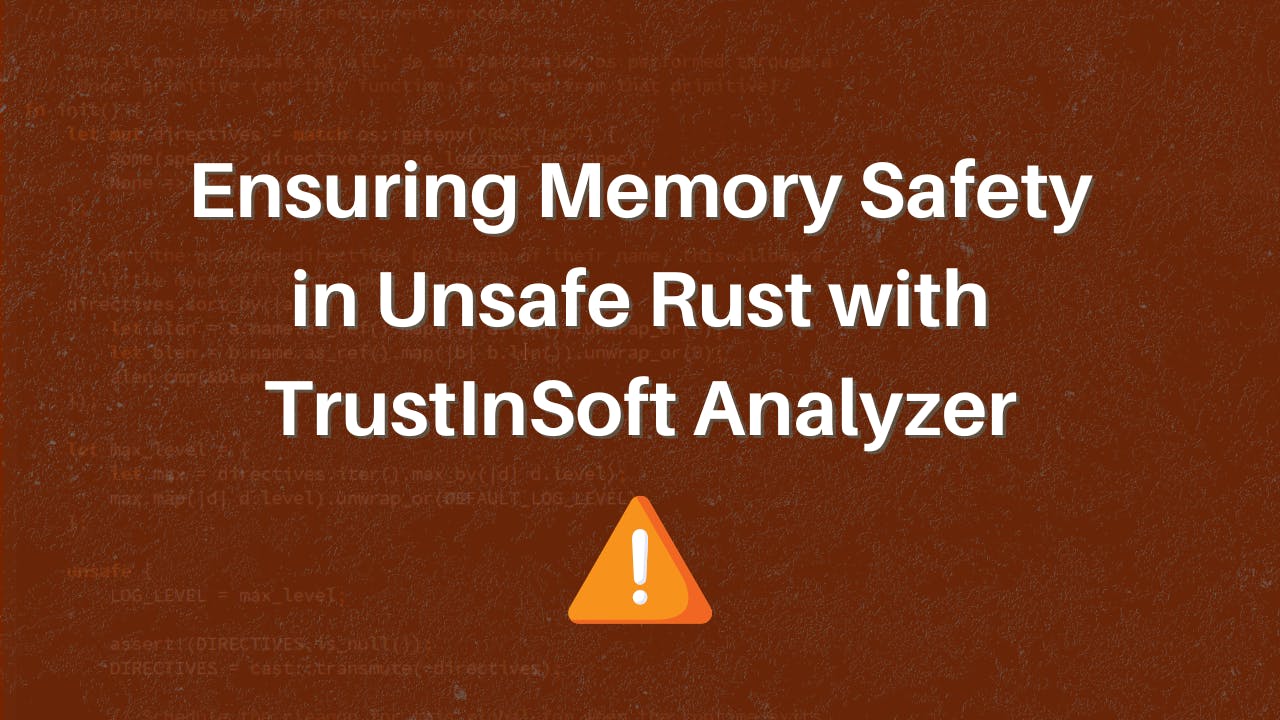Ensuring Memory Safety in Unsafe Rust with TrustInSoft Analyzer
November 27, 2025

Rust has emerged as a leading systems programming language, celebrated for its robust memory safety features. Its strict compile-time checks effectively prevent common pitfalls like null pointer dereferences and data races, making it a compelling choice for developing secure applications. However, Rust also acknowledges the necessity of low-level operations and seamless interaction with external code, which introduces the concept of unsafe Rust.
The Dual Nature of Rust
unsafe Rust empowers developers to bypass certain safety checks for specific tasks, such as dereferencing raw pointers, invoking unsafe functions, or directly mutating static variables. This capability is often essential when interfacing with C/C++ libraries through the Foreign Function Interface (FFI), implementing low-level system programming tasks, or optimizing performance-critical sections of code.
While unsafe Rust offers the flexibility required for these scenarios, it also brings inherent risks. By circumventing safety checks, developers assume direct responsibility for ensuring memory safety. Failure to do so can lead to memory safety vulnerabilities, undefined behavior, and potential security exploits. When unsafe code blocks delegate memory safety to the developer for validation, Rust relies on thorough checks.
Common Vulnerabilities in unsafe Rust
Several memory safety vulnerabilities can surface in unsafe Rust code. These include:
- Buffer overflows: Writing beyond the allocated boundaries of a memory region.
- Use-after-free: Accessing memory that has already been deallocated.
- Data races: Concurrent access to mutable data without proper synchronization mechanisms.
- Integer overflows: Exceeding the maximum representable value of an integer type.
- Panics: Unhandled exceptions that can result in unexpected program termination.
Attackers can exploit these vulnerabilities to compromise system security, emphasizing the need for proactive measures to address them. The unsafe keyword is frequently needed. In fact, about 20% of (general purpose) packages use unsafe.This is especially applicable to low-level or embedded code.
FFI and Its Challenges
Rust's FFI is crucial for interoperability with languages such as C and C++. Managing memory and ensuring type safety when crossing the FFI boundary presents unique challenges. Common FFI-related vulnerabilities include incorrectly handling pointers passed between Rust and C/C++, memory leaks due to improper allocation and deallocation, and type mismatches leading to undefined behavior. For instance, returning a dynamically allocated string necessitates careful memory management to avoid dangling pointers and memory leaks when using Rust with other languages via FFI.
Enhancing Memory Safety in unsafe Rust
TrustInSoft Analyzer plays a critical role in verifying unsafe Rust code to bolster memory safety. It employs formal verification and advanced static analysis to help prevent memory safety vulnerabilities, panics, and undefined behavior. This approach offers several key benefits, including early detection of vulnerabilities during development, a reduced risk of runtime errors and security exploits, improved code reliability and maintainability, and compliance with safety-critical standards. TrustInSoft Analyzer provides mathematically proven memory safety without false negatives and very few false positives, saving time and effort in the development process.
Best Practices for Safe unsafe Rust
Writing safe unsafe Rust code requires adherence to established best practices. These include thoroughly validating all inputs and outputs of unsafe functions, using appropriate memory management techniques to prevent leaks and dangling pointers, employing exhaustive static analysis tools like TrustInSoft Analyzer to detect potential vulnerabilities, and writing comprehensive unit tests to verify the correctness of unsafe code. Careful code review and collaboration are also essential to ensure the safety of unsafe Rust code, especially in critical applications where safety, security, and reliability are essential.
Writing safe unsafe Rust code presents certain challenges. However, leveraging the appropriate tools and techniques is paramount. TrustInSoft Analyzer significantly enhances the memory safety of unsafe Rust code, equipping developers with the necessary resources to build secure and reliable software. Exploring TrustInSoft Analyzer and its capabilities for verifying unsafe Rust code can ensure that your projects are secure by design.